In a 2015 article concerning this deployment of troops in France, I wrote of the thousands of armed soldiers that were about to be deployed into the streets as ‘a move that bears a striking resemblance to the beginnings of Martial Law in Europe…’
I also said in the same post that London would probably follow.
I actually don’t want to bother talking about the Parsons Green incident itself – but to explore a broader question about the response to it; and about the idea of armed soldiers being out in public to protect us from terror threats.
We can mostly skip the usual repetoire concerning the ‘terror incident or false flag?’ question (analysing footage, lack of CCTV, speculation on ‘crisis actors’, etc) and leave that to others.
A crude explosive device was apparently to blame for the tube incident in Parsons Green (though, from photos, it appears not to have damaged the bucket or container it was in), with around two dozen or so people reportedly injured and needing hospitalisation.
Quite possibly this IED was placed by a terrorist, ISIS sympathiser or lone wolf. And possibly it wasn’t.
I actually barely care anymore – since we now appear to have terror incidents (or false flags – take your pick) more often than we even have rainfall; and there’s increasingly very little to say that hasn’t already been said (in terms of both argument and counter-argument).
I want to instead go straight onto another (related) subject: specifically, the deployment of soldiers and armed police. And whether or not we should be worried about this.
It is a much broader question/subject than just talking about a specific terror incident.
My suspicions – which I’ve been expressing since Charlie Hebdo – has been that one of the chief objectives of the Gladio-style terror wave is to bring about a gradual normalisation of armed troops on the streets across multiple countries.
Everything since Charlie Hebdo seems to have reinforced that suspicion.
When the UK began deploying armed soldiers out into public a few months ago, I assumed it would be indefinite, as has been the case in France.
It wasn’t, however – but this latest incident has green-lit that scenario again.
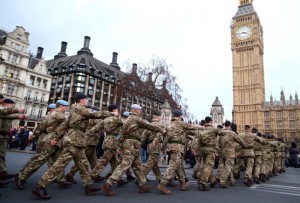
It remains to be seen whether it is only temporary or whether it becomes long-term. If a few more incidents like this occur, there’s a good chance the militarisation response will become the new normal.
And it’s really worth asking where that would take us.
We would then be in a situation where the UK, France, Germany, Belgium (and possibly others – I’m not sure which other countries have done it yet) all have armed soldiers out in public places because of the perceived terror threat.
Ever since France went down this route (right after Charlie Hebdo), I have wondered if there’s a longer-term plan in place to have armed soldiers in the streets for some future reason that doesn’t have anything to do with ‘ISIS’ or terrorism, but which the current terror wave provides the excuse for.
You could arguably see a microcosm of this idea in the recent Barcelona attack, which gave Spannish authorities the premise for sending in armed troops to Catalonia (just ahead of the controversial Catalonian independence referendum, in which the Spannish state fears a breakaway, independent Catalonia). See the article on that here.
In a 2015 article concerning this deployment of troops in France, I wrote of the thousands of armed soldiers that were about to be deployed into the streets (10,000 at the time) as ‘a move that bears a striking resemblance to the beginnings of Martial Law in Europe’.
I also wrote specifically in that article over two years ago, ‘There is a reason to suspect London may be next’.
I wrote at the time, ‘What it looks like at this stage is a kind of testing of the waters; a warming up of the population to the reality of armed troops in public places and seeing how the people react. What’s happening in France might be being watched and assessed by other Western nations who may be preparing for something similar in the near future…’
Even Germany has been willing to deploy armed troops onto the streets (for the first time since World War II) in order to protect against the ‘ISIS’ threat. Such a possibility wasn’t even conceivable in Germany until a court decision in 2012 (a few years before the ISIS problem emerged) altered the constitution to allow armed forces to be deployed.
The law for many (post World War II) decades in Germany has been to forbid the combining of the police forces and the army.
To understand why many in Germany have been unsettled about the bypassing or reinterpretation of this prohibition, read ‘The Danger of Deploying the German Army at Home’ here.
In the UK, we haven’t got to where France is yet. But it’s worth looking at the situation in France as a guide-post – because while, for a year or so, Paris seemed to be the terror/false-flag/psy-op epicenter (read ‘Paris, City of ISIS – Mass Hypnosis, Occult Symbolism & Major Psy-Op’ here), this now seems to have shifted to London or England.
The troop mobilisation in France was meant to be temporary – the November 13th Paris attacks gave the government reason to continue the State of Emergency, however.
Even after this, it was meant to be temporary: but the Mossad-linked Nice attack (Bastille Day attack) gave them a renewed reason to keep the situation going on indefinitely. I noted this as the major clue at the time for the Nice attack having been a false-flag (see here).
The Nice lorry attack occurred at precisely the same time that Francois Hollande had announced the state of emergency was finally going to end – it literally provided the excuse, right on time, for the state of emergency to remain and for the troops to stay.
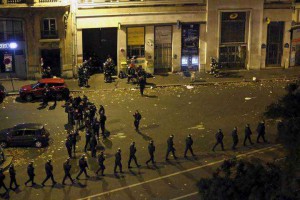
The reason Nice was needed was that the government was having a hard time justifying the continuing state of emergency, which had a lot of opposition. A commission had in fact found that the state of emergency was only having a “limited impact” on improving security.
A Human Rights Watch article, dated April 20th 2016, was asking the question ‘Will France’s State of Emergency Ever End?’
It noted, ‘The state of emergency grants the government considerable powers to search homes without judicial warrants and impose control orders, designed to restrict the movement of people authorities consider a threat to public order or security, but who have been charged with, far less convicted of, nothing… People described to us how police officers stormed into their homes in the middle of the night, broke their belongings, traumatized their children…’
It continued, ‘As it seeks to extend these powers once again, the government should explain why it cannot ensure public order and safety with the wide range of laws and powers already at its disposal. The prospect of eight months of the state of emergency – with no commitment as to when it might end – raises the question of whether it could, in fact, become permanent.’
In fact, it does seem to have become permanent.
And it has since spread to other countries.
There is legitimate reason to be concerned that the UK is poised to go down the same route – and that we’re being set up for that, one terror incident at a time.
When armed forces are brought in to the equation, there is also often an ambiguity to what particular type or grouping of personnel is involved.
According to The Mirror, “Elite Hercules robocops” showed up in Parsons Green after the tube incident. As previously noted, during the London Bridge attack in June, an elite SAS unit ‘Blue Thunder’ unit was involved on the scene.
I am also often reminded of the claims by former MI5 officer, Richard Tomlinson, who said that there exists a secret paramilitary unit called ‘The Increment’, which carries out covert/black ops on behalf of Her Majesty’s Government.
According to him, its recruits are plucked from the the SAS and SBS and carry out special assignments with the intelligence services.
In modern times, the first danger that comes to mind when thinking about armed forces being deployed in London is the potential for the repeating of something like the execution of Jean Charles de Menezes.

Some experts, including Professor Michael Clarke, Professor of Defense Studies at King’s College London, had said at the time that they believed it wasn’t police but some kind of Special Forces who’d gunned down the Brazilian electrician.
An immediate problem I’ve perceived with the idea of special forces – or an amorphous mix of intelligence operatives, army personnel or police – being out in public places is that you will create even more confusion as to whether it is real ‘terrorists’ or state actors carrying out any given action.
I’ve pointed this out before, particularly noting the fact that the footage of the alleged jihadist attackers in Paris during the Charlie Hebdo attack had them dressed and looking exactly like some of the special forces personnel who were also all over the scene after the fact.
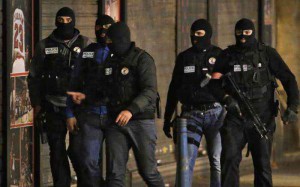
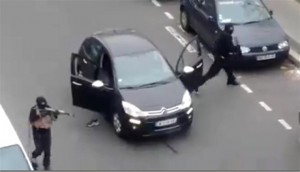
An identical problem unfolded with the later November 13th Paris attacks. There remains a very strong case to be made that French special forces and intelligence agents were involved in carrying out or facilitating both the Charlie Hebdo and November 13th attacks (see here and here).
There is something else I want to bring back to everyone’s attention here too.
In that same article about the French armed forces from two years ago, I also drew attention to a story that had largely passed under the radar of most people and was not covered in the mainstream media.
It may not have any relevance to the subject we’re discussing – or it may be significant (I haven’t been able to decide).
On December 1st 2014, I had come across a piece on the Films For Action website titled ‘Why Are London’s Police Traveling to Israel?’
Quoting its source, it highlighted that in the six-month period from 1st March 2014 to 31st August, eighty of London’s Metropolitan Police staff had gone to Israel for unknown purposes. The Metropolitan Police would not reveal the purpose of the trips, nor would it identify the ranks of the police personnel involved. A reason given for withholding the information was that it would “have the effect of compromising law enforcement tactics and strategies”.
What “law enforcement tactics and strategies” specifically?
This is curious in itself; but it was also revealed elsewhere that the Israeli Army was systematically training US police forces in tactics and strategy they themselves had honed and developed as an occupying army in parts of the illegally occupied territories; a fact that could be said to be especially interesting in light of high-profile revelations about US police brutality (as well as the immunity of offending police officers from legal consequences in many cases – leading to, among other things, the Black Lives Matter business).
It also begs the question now as to whether European police forces have received any similar training? Why *were* London police personnel in Israel in 2014 and so secretive about it?
Incidentally, the period that the London police staff were in Israel happened to coincide with ‘Operation Protective Edge’, the bombardment and massacre of over 2,000 Palestinians, mostly civilians, in the Gaza Strip.
What could the London Metropolitan Police have been learning in Israel at that time? London, after all, is nothing like Gaza.
This video below is of a talk given on March 3rd the same year by Eran Efrati, which includes information that United States police forces were being trained by the Israeli Army. Eran Efrati is a former IDF soldier and the talk was filmed in Denver, Colorado.
I had found this information interesting at the time; but even more so when French soldiers were being deployed en masse and behind the smokescreen of a ‘terror threat’ that has at least in part been artificially created in order to evoke widespread public acceptance and support for this mobilisation (and in the cases of some of these key incidents – particularly Charlie Hebdo and Nice, the Israel/Mossad connections were fairly obvious).
Again, I don’t know for certain if that Israeli tangent is relevant to this subject or not.
But getting back to the main theme: if, as things develop, multiple countries are doing the same thing – merging armed forces with police and having them on the streets – I wonder how long before this begins to coalesce into some kind of inter-linked, multi-national armed force; perhaps even for the long-term purposes of general population control.
Some of the accounts from France – of armed troops invading homes, arbitrarily arresting people, etc – paint a negative picture of what things might end up like. All the more worrying if there are elements of, for example, British or American police, taking training from Israeli soldiers whose primary experience in Gaza is as an occupying force.
I noted in the Nice article – and in subsequent posts – that what we might end up with (once the ‘ISIS’ business is over – assuming it ever is over) is ‘an NSA-style surveillance super-state that spans the entire Western world, backed up on the ground by armed troops with expanded powers to arrest, confine or eliminate people’.
In terms of the UK, most of this may already be in place with the recently passed ‘Snooper’s Charter’ and the Secret Courts system (a paradigm I covered at length here just before the election), with the possibility of armed troops merging more and more with the police being potentially the last piece of that puzzle.
This particular perspective – making sure you view the potential mobilisation of armed forces in the context also of the existing mass surveillance programme – is, I think, key.
Because, as I argued before, it is only about ‘the terrorists’ right now – but tomorrow or seven years from now, it might be about some other group of people deemed to be a threat. And this shift can happen very quickly – and even very subtly.
If we look at France again, it is very telling. I keep coming back to the Charlie Hebdo attack, because it was so significant.
And something interesting happened immediately after the Charlie Hebdo false-flag and subsequent troop deployment – the new powers being discussed were immediately framed in a narrative of attacking individuals who ‘defend terrorism’.
That’s incredibly vague. What does ‘defending terrorism’ mean?
The spate of arrests immediately following the Charlie Hebdo attack included a comedian, for example, and included a four-year prison sentence given to a man in northern France who defended the attacks in a drunken rant while resisting arrest. At least 54 people (including an 8-year-old child who was referred to the special forces by school teachers after being heard shouting something in Arabic) were arrested in France for “defending” or “glorifying” terrorism right after Charlie Hebdo.
And the problem is that this term is so vague (as is the term ‘extremism’ – which can be difficult to define) that it potentially gives police and security agencies (or armed soldiers, as it may be) a great deal of scope for targeting individuals who have absolutely no links to terrorism and are involved in no criminal activities, but have merely expressed a certain view or shown sympathy towards a certain view.
A friend of this blog, living in France and going by the name ‘Intellecteur’, gave me her own views on the climate in her country immediately after Charlie Hebdo, and what she described has Orwellian State written all over it. “I’m a French college student and here in France we’re all afraid to talk about this subject on social media because, as you may have heard, the French government is arresting so many people for not thinking the way they want/need us to,” she wrote at the time. “We’re even afraid to talk about it with our friends, in case someone else is hearing or reading this, because every doubt is a step to jail…”
That’s not where we are yet – at least not in the UK.
But it seems to be increasingly like only a matter of time.
And the notion of an increasingly amorphous blur (over time) of mass surveillance, intelligence services, police and armed soldiers policing public spaces (both real-world and cyber), doesn’t – in that context – seem like a great idea.
A lot of how you perceive this subject depends on whether you believe the terror incidents are ‘real’ in the strictest sense or whether they’re either false-flag operations or, as I prefer to call them, ‘state-enabled terror’ attacks.
If it’s the former, you might think deploying armed soldiers into public places and blurring the lines between police and army would be a good thing that will keep us all safe. If it’s the latter you believe, you’ll regard this with deep suspicion and wonder if there’s anything good that can come from this idea being normalised.
Like many Germans, I very much dislike the idea of the line being blurred between police and the army – and of armed soldiers becoming normalised in public places.
I am also suspicious of multiple countries doing it at the same time, particularly in response to a terror threat that was largely created with Western government/intelligence collusion in the first place.
Related: ‘The UK’s Police State – All the Pieces Are in Place‘…
Read more: ‘From London to Orlando – Mass Psychological Warfare & the Terror Psy-Opera‘, ‘The Truth About the Manchester Arena Attack‘, ‘London Bridge Terror Attack: Notes & Observations‘, ‘French Police Commissioner Suicided as Charlie Hebdo Attack Exposed‘, ‘Paris, Friday 13th Attacks Were False-Flag Operation‘, ‘Why the Nice/Bastile-Day Attack Was a False-Flag‘…
See ALL ‘False-Flag Terror’ posts here.


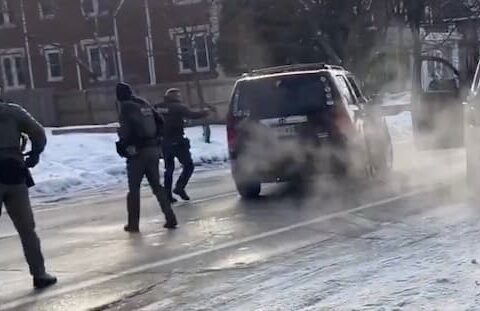
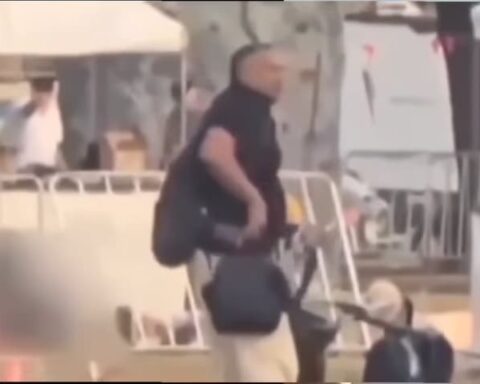
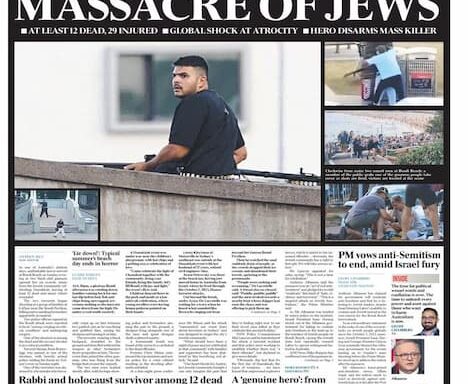
Looking at the new labour laws Macron is trying to pass, has this deployment of troops and the ‘state of emergency quite convenient for the powers that be?
Thanks BBoB – sober and informed as always. I sense your exasperation no doubt because I feel it too. How did we survive the decades of IRA attacks without hearing about ‘UK threat levels’, with barely any survellence and a police force armed mostly with truncheons? I remember laughing at those US celebrities who said they wouldn’t travel to Britain because they were afraid of being bombed. In short, we understood the dangers and simply took sensible precautions and that was all.
Now, as you say, we seem set to follow the French into a perpetual state of emergency – martial law comes next. This is truly horrifying.
And yours points about links to Israel are extremely illuminating . I have come to believe that the occupation of Palestine might in fact be an experiment in part – the zone where our own would-be oppressors learn best practice. A testing ground to hone techniques to quell opposition and suppress all dissent, and a benchmark to any nation that wishes to construct a prison to contain its entire population. Truly terrible.